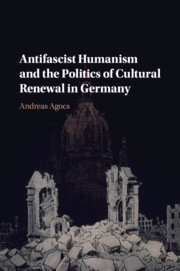Description
Antifascist Humanism and the Politics of Cultural Renewal in Germany
Author: Agocs Andreas
This study traces German traditions of cultural renewal from their beginnings in antifascist activism to their failure in the emerging Cold War.
Language: English
Subject for Antifascist Humanism and the Politics of Cultural...:
Approximative price 32.87 €
In Print (Delivery period: 14 days).
Add to cart
Antifascist Humanism and the Politics of Cultural Renewal in Germany
Publication date: 06-2019
Support: Print on demand
Publication date: 06-2019
Support: Print on demand
Approximative price 114.03 €
In Print (Delivery period: 14 days).
Add to cart
Antifascist Humanism and the Politics of Cultural Renewal in Germany
Publication date: 07-2017
Support: Print on demand
Publication date: 07-2017
Support: Print on demand
Description
/li>Contents
/li>Biography
/li>
Antifascism is usually described as either a political ideology of activists and intellectuals confronting the dictatorships of Hitler and Mussolini, or as a cynical tool that justified the Stalinist expansion of communism in Europe. Andreas Agocs widens our understanding of antifascism by placing it in the context of twentieth-century movements of 'cultural renewal'. He explores the concept of 'antifascist humanism', the attempt by communist and liberal intellectuals and artists to heal the divisions of Nazism by reviving the 'other Germany' of classical Weimar. This project took intellectual shape in German exile communities in Europe and Latin America during World War II and found its institutional embodiment in the Cultural League for Democratic Renewal in Soviet-occupied Berlin in 1945. During the emerging Cold War, antifascist humanism's uneasy blend of twentieth-century mass politics and cultural nationalism became the focal point of new divisions in occupied Germany and the early German Democratic Republic. This study traces German traditions of cultural renewal from their beginnings in antifascist activism to their failure in the emerging Cold War.
Introduction: antifascist humanism and the dual legacies of Weimar; Part I. Defending the 'Other Germany': 1. The humanist front: antifascism and culture wars, 1934–9; 2. 'Otra Alemanias': antifascist humanism in the diasporam, 1939–44; 3. The 'other Germany' from below: antifascist committees and national renewal in 1945; Part II. Contesting 'Other Germanies': 4. Antifascism as renewal and restoration: the cultural League for the democratic renewal of Germany, 1945–6; 5. Humanism with a socialist face: Sovietization and 'ideological coordination' of the Kulturbund, 1946–7; 6. The limits of humanism: cultural renewal and the outbreak of the Cold War, 1947–8; 7. Mass organization and memory: antifascist humanism in divided Germany, 1948 and beyond; Conclusion: from the Saar to Salamis.
Andreas Agocs is currently visiting Assistant Professor at the University of the Pacific, California, where he teaches modern German and European History. His research area is the cultural and political history of Germany and Central Europe during the nineteenth and twentieth centuries.
© 2024 LAVOISIER S.A.S.




